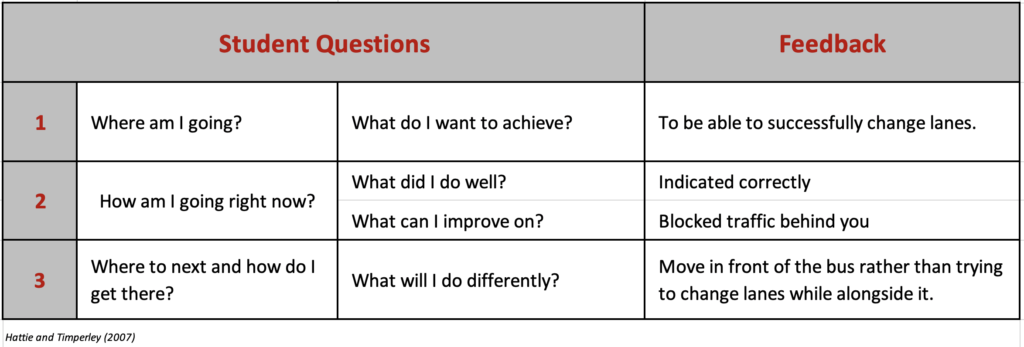Growth – Jennifer Oaten

As parents, many of us have taught our children to drive and witnessed their growth. When teaching our children to drive, we start with; which is the brake and accelerator, how to start the car, and then about looking in the mirrors and over their shoulder before taking off. It requires constant feedback and encouragement. Effective learning needs effective feedback.
I am regularly asked how Santa Maria College achieves such strong academic results and student growth? One of the key reasons is the quality of the feedback our staff provides our students. Research by internationally renowned Professor of Education, John Hattie shows students who receive high-quality feedback in a timely and appropriate manner significantly improve their performance and growth. This information supports students in moving from their current performance to their desired performance.
What is good feedback?
As a College, we have had a strong focus on providing rich feedback to our students over the past few years, and recently all our teaching staff participated in a workshop to further refine their skills.
So what does effective feedback look like? Effective feedback answers three key questions:
1. Where am I going?
2. How am I going right now?
3. Where to next and how do I get there?

Teachers spend a great deal of time writing feedback which can be very valuable, but often students go directly to the mark and don’t read and action the in-depth feedback. So how can we overcome this? This term, we will be trialling, in some classes, giving our students their feedback first before they receive their results.
Peer feedback is also an extremely valuable learning tool. Students have a rubric or marking key to guide them in the process which enables them to review others’ answers and provide constructive feedback. This analysis of a peer’s answers can also be applied to their own learning. Self-reflection and evaluation are other excellent tools that can help to promote growth in learning
How can parents help?
Here are three great questions you can ask.
- What did you do well?
- What can you improve on?
- What will you do differently next time?
Help us to pivot your daughter’s focus from marks to growth. In doing so, you will find you have a greater opportunity for a more reflective conversation about assessments and activities.
So when you next take your daughter for her driving lesson, see if you can assist the growth of her skills by providing effective feedback just like our teachers endeavour to do…. good luck!

With Laurissa Knowles From Valley Depths to Mountain Peaks (1993)
Laurissa Knowles (1993) has had an incredible career journey so far, from Santa Maria College Teacher to Celebrant and Councillor.

Elevating Spaces: Diana Ellis’ Signature Touch & Architecture Magic
What happens when you mix a love for art, travel, nature, and creativity with construction and building? You get the essence of Diana Ellis’ career!

The Power of Expectations in Shaping Student Success – Jennifer Oaten
Discover the transformative impact of expectations on student success. Learn how belief shapes outcomes in education and beyond.
- Featured
Author: Santa Maria College
Santa Maria College is a vibrant girls school with a growing local presence and reputation. Our Mission is to educate young Mercy women who act with courage and compassion to enrich our world. Santa Maria College is located in Attadale in Western Australia, 16 km from the Perth CBD. We offer a Catholic education for girls in Years 5 – 12 and have 1300 students, including 152 boarders.






